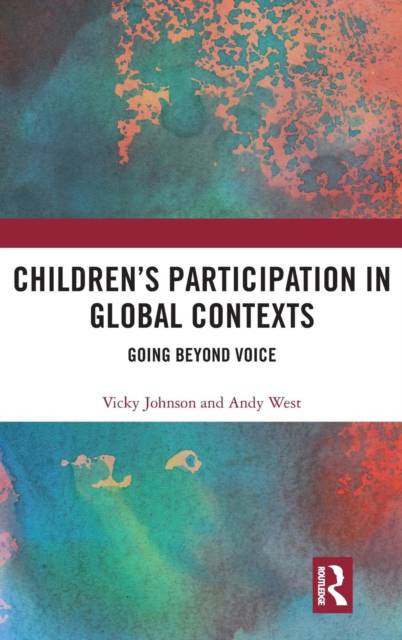
- Retrait gratuit dans votre magasin Club
- 7.000.000 titres dans notre catalogue
- Payer en toute sécurité
- Toujours un magasin près de chez vous
- Retrait gratuit dans votre magasin Club
- 7.000.000 titres dans notre catalogue
- Payer en toute sécurité
- Toujours un magasin près de chez vous
Children's Participation in Global Contexts
Going Beyond Voice
Vicky Johnson, Andy WestDescription
Children's and young people's right to participate has been increasingly acknowledged and taken up internationally, as expressed in the UN Convention on the Rights of the Child. Yet much of this has focused on collecting children's voices, rather than achieving change, and has met its limits. This book provides an analysis of children's participation in formal, collective and action research processes in six different international settings. It offers a deeper understanding of what helps and facilitates children's and young people's participation through research, evaluation and decision-making to go beyond voice and effect change. This analysis is set in the context of historical and current discourses of participation, the sociology of childhood, contemporary anthropology, children's geography and international development.
Themes addressed include time and processes in children's participation, shifting and multiple identities of children, political and cultural contexts, places and spaces children inhabit, skills and capacities of adults, accountability and power. The analysis promotes an approach to children's participation as relational and collaborative, and will contribute to answering some of the questions facing practitioners and researchers embarking on participatory enquiry with children and young people.
This is an invaluable book for practitioners and for scholars, postgraduates in anthropology, sociology, human geography, childhood studies, development studies, social policy, social work, community work, education, youth work and those with an interest in citizenship, children's rights and human rights. Researchers and practitioners in UN, government and non-government services will also find it applicable to engaging with children and young people.
Spécifications
Parties prenantes
- Auteur(s) :
- Editeur:
Contenu
- Nombre de pages :
- 232
- Langue:
- Anglais
Caractéristiques
- EAN:
- 9781138929791
- Date de parution :
- 05-04-18
- Format:
- Livre relié
- Format numérique:
- Genaaid
- Dimensions :
- 156 mm x 234 mm
- Poids :
- 503 g







